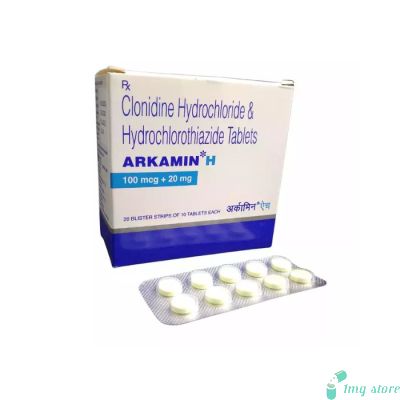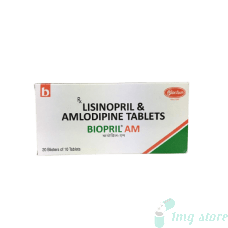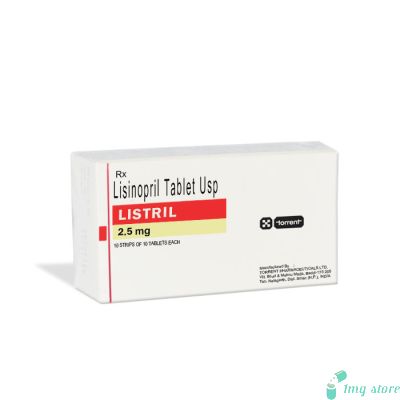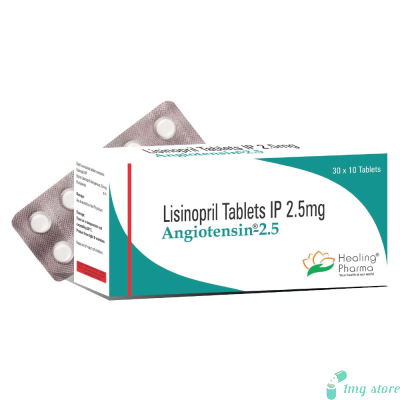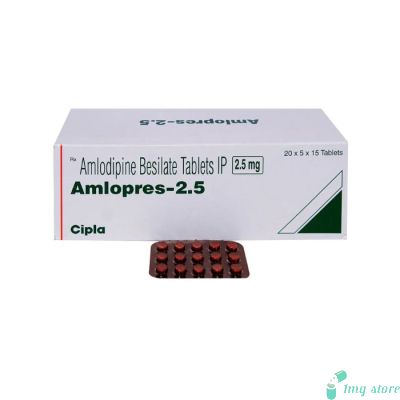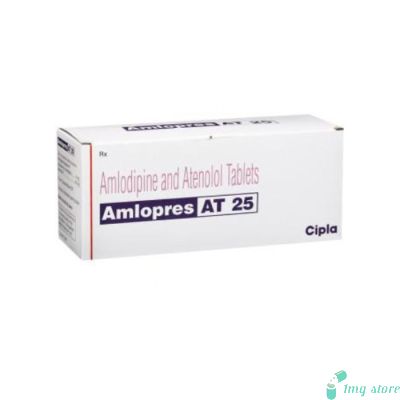Prazopress Tablet (Prazosin)
Prazopress Tablet (Prazosin) is a medication used to treat high blood pressure, reducing the risk of heart attack or stroke. Additionally, it may be prescribed for heart failure and mild enlargement of the prostate gland. Minipress is another brand name for Prazosin.
Prazopress Tablet (Prazosin)- For Hypertension and to Manage Symptoms
Prazosin Tablet, also known by its brand name Prazopress, is a medication primarily used to treat High Blood Pressure. It belongs to a class of drugs called alpha-1 blockers, and its main active ingredient is prazosin hydrochloride. Another brand name for prazosin is Minipress. Prazosin works by relaxing and widening the blood vessels, allowing for smoother blood flow and lowering blood pressure. This medication is commonly prescribed for conditions such as hypertension (high blood pressure), benign prostatic hyperplasia (enlarged prostate), and certain circulation disorders. Minipress is a well-known alternative brand name for prazosin. Both Prazopress and Minipress contain the same active ingredient and have similar therapeutic effects. It's important to note that while Prazopress and Minipress are interchangeable, it is recommended to use the specific brand name mentioned in your prescription to ensure accurate dosing and administration. As with any medication, it is essential to follow the prescribed dosage and instructions provided by your healthcare professional. If you have any concerns or questions about Prazopress (or Minipress), it is best to consult with your doctor or pharmacist for further guidance.
Prazosin for PTSD: Prazosin has also shown effectiveness in managing symptoms of post-traumatic stress disorder (PTSD). It helps alleviate nightmares and sleep disturbances associated with PTSD by blocking the activation of certain receptors in the brain. Prazopress 2mg is a specific strength of Prazosin tablets. It is important to follow the prescribed dosage and instructions provided by your healthcare professional when taking Prazopress 2mg or any other strength of Prazosin.
Dosage Information:
The dosage of Prazosin medication (Prazopress/Minipress) can vary depending on the condition being treated and individual patient factors. It is important to follow the specific instructions provided by your healthcare professional. The following dosage information is a general guideline:
High Blood Pressure (Hypertension):
Initial dose: The typical starting dose is 1 mg, taken orally two or three times a day.
Maintenance dose: The dosage may be gradually increased to achieve the desired blood pressure control, usually up to a maximum of 20 mg per day, divided into multiple doses.
Benign Prostatic Hyperplasia (Enlarged Prostate):
Initial dose: The usual starting dose is 1 mg, taken orally two or three times a day.
Maintenance dose: The dosage may be increased gradually, based on individual response and tolerance, to a maximum of 20 mg per day, divided into multiple doses.
It is important to note that the exact dosage and frequency may vary depending on your specific medical condition and response to treatment. Always follow your healthcare provider's instructions regarding the dosage and duration of Prazosin Tablet.
Benefits:
Prazosin Tablet (Prazopress/Minipress) offers several benefits in the management of certain medical conditions, including:
Lowering Blood Pressure: Prazosin is primarily prescribed to treat hypertension (high blood pressure). Relaxing and widening the blood vessels helps to reduce the resistance to blood flow, thereby lowering blood pressure levels.
Relief of Enlarged Prostate Symptoms: In the case of benign prostatic hyperplasia (BPH), Prazosin can help alleviate urinary symptoms associated with an enlarged prostate gland. It relaxes the muscles in the prostate and bladder neck, making it easier to urinate and relieving urinary difficulties.
Treatment of Circulation Disorders: Prazosin may also be used in the treatment of certain circulation disorders, such as Raynaud's disease or peripheral vascular disease. By dilating blood vessels, it improves blood flow to the extremities, reducing symptoms like cold hands and feet or pain caused by restricted circulation.
If you're looking to buy Prazosin tablets, you can visit 1mgstore.com, a trusted online pharmacy where you can find this medication.
When taking Prazosin medication it is important to keep the following precautions in mind:
- Follow the prescribed dosage and instructions provided by your healthcare professional. Do not increase or decrease the dosage without consulting your doctor.
- Regularly monitor your blood pressure and heart rate as directed by your healthcare provider. Notify your doctor if you notice any significant changes or abnormalities.
- Inform your doctor about any pre-existing heart conditions, such as heart failure or coronary artery disease, as well as any other medications you are currently taking. Certain medications may interact with Prazosin (Minipress) and affect its effectiveness or increase the risk of side effects.
- Rise slowly from a sitting or lying position to minimize the risk of dizziness or lightheadedness, as Prazosin may cause a drop in blood pressure upon standing.
- Avoid activities that require alertness and coordination until you know how Prazosin affects you, as it may cause drowsiness or dizziness.
- If you are scheduled for surgery or any dental procedure, inform the healthcare professionals involved that you are taking Prazosin, as it may interact with anesthesia and other medications used during the procedure.
Here is the Application of Prazosin in brief:
High Blood Pressure (Hypertension): Prazosin helps lower blood pressure by relaxing and widening the blood vessels, allowing for smoother blood flow and reducing the strain on the Heart and Blood Pressure.
Benign Prostatic Hyperplasia (Enlarged Prostate): Prazosin can relieve urinary symptoms associated with an enlarged prostate gland. It relaxes the muscles in the prostate and bladder neck, making it easier to urinate and improving urinary flow.
Post-Traumatic Stress Disorder (PTSD): Prazosin (Minipress) is sometimes prescribed off-label to manage symptoms of PTSD, specifically nightmares and sleep disturbances. By blocking certain receptors in the brain, it helps reduce the intensity and frequency of nightmares.
Circulation Disorders: Prazosin may be used to improve blood flow in conditions like Raynaud's disease or peripheral vascular disease. By dilating blood vessels, it helps increase blood supply to the extremities, reducing symptoms like cold hands and feet or pain caused by restricted circulation.
Prazosin may cause certain After effects Such as:
Low Blood Pressure: Prazosin can cause a drop in blood pressure, leading to symptoms like dizziness, lightheadedness, or fainting. It is important to rise slowly from a sitting or lying position to minimize these effects.
Drowsiness and Fatigue: Prazosin (Minipress) may cause drowsiness or fatigue, affecting alertness and coordination. It is advisable to avoid activities that require mental focus or physical coordination until you know how the medication affects you.
Headache: Headaches can occur as a common side effect of Prazosin. If persistent or severe, it is recommended to inform your healthcare provider.
Dry Mouth: Some individuals may experience dryness of the mouth while taking Prazosin. Maintaining good oral hygiene and staying hydrated can help alleviate this symptom.
Nasal Congestion: Prazosin may cause nasal congestion or a stuffy nose in some cases. If bothersome, over-the-counter nasal decongestants may provide relief, but it's important to consult with a healthcare professional first.
Gastrointestinal Issues: Prazosin can cause gastrointestinal side effects such as nausea, vomiting, or diarrhea. These symptoms are usually mild and temporary.
Priapism (Rare): Priapism, a prolonged and painful erection unrelated to sexual activity, is a rare but serious side effect. Seek immediate medical attention if this occurs.
Help Section About Prazopress Tablet (Prazosin)
FAQ: Can Prazosin be taken with other medications for heart conditions?
Answer: It is important to inform your healthcare provider about all medications you are taking, including those for heart conditions. Some medications may interact with Prazosin, affecting its effectiveness or increasing the risk of side effects. Your doctor can assess potential interactions and make appropriate recommendations.
FAQ: Can Prazosin (Minipress) be used by pregnant women?
Answer: Prazosin is generally not recommended for use during pregnancy. It is important to discuss any potential risks and benefits with your healthcare provider. They can provide guidance based on your individual situation and recommend alternative treatment options if necessary.
FAQ: Is it safe to abruptly stop taking Prazosin?
Answer: It is generally not recommended to abruptly stop taking Prazosin without consulting your doctor. Sudden discontinuation can lead to a rebound increase in blood pressure or other unwanted effects. Your healthcare provider will provide guidance on the proper way to gradually reduce the dosage if discontinuation is necessary.
FAQ: Can Prazosin be used in children?
Answer: Prazosin is primarily used in adults for heart and blood pressure conditions. Its use in children is limited and should be determined by a pediatric specialist. The safety and effectiveness of Prazosin in pediatric populations require careful evaluation and monitoring.
For Prazosin, It is important to be Aware of Potential Drug Interactions.
Other Blood Pressure Medications: Combining Prazosin with other medications used to lower blood pressure, such as beta-blockers or calcium channel blockers, may result in an additive effect, leading to a significant decrease in blood pressure. Close monitoring by your healthcare provider is important to prevent excessively low blood pressure.
Erectile Dysfunction Medications: Drugs used to treat erectile dysfunction, such as sildenafil (Viagra), tadalafil (Cialis), or vardenafil (Levitra), can also lower blood pressure. When taken with Prazosin, these medications can have an additive effect, potentially causing a significant drop in blood pressure. Consult your doctor before combining these medications.
Diuretics: Prazosin (Minipress) may enhance the effects of diuretics, commonly known as water pills, which increase urine production and reduce fluid retention. The combination of Prazosin and diuretics can lead to excessive fluid loss and low blood pressure. Regular monitoring of blood pressure and electrolyte levels is important when using this combination.
Nonsteroidal Anti-Inflammatory Drugs (NSAIDs): NSAIDs, such as ibuprofen or naproxen, are commonly used for pain relief. They can interfere with the blood pressure-lowering effects of Prazosin, potentially reducing its effectiveness. It is advisable to consult your doctor or pharmacist before taking NSAIDs alongside Prazosin.
Herbal Supplements: Certain herbal supplements, such as Hawthorn, Ginseng, or Licorice root, may have effects on blood pressure. When combined with Prazosin, these supplements can interact and affect blood pressure control. Always inform your healthcare provider about any herbal supplements you are taking.
| Manufacturer | : | Sun Pharmaceutical Industries Ltd |
| Equivalent Brand | : | Minipress |
| Generic Search | : | Prazosin |











